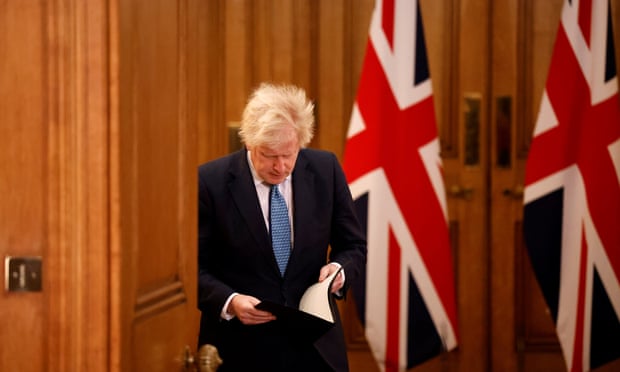Boris Johnson comes under fire as countries suspend travel from UK over new Covid variant
In the eyes of the world’s media, Britain – a “Plague Island” led by a man who thinks “optimism is a substitute for hard truths and proper management” – is currently getting a good lesson in “what ‘reclaiming sovereignty’ means”.
If never quite explicit, the schadenfreude is palpable as dozens of countries, days before the end of the Brexit transition period and with no trade deal yet agreed, suspend travel from the UK in response to the new, more contagious coronavirus variant.
Much of the blame was on Boris Johnson, whose U-turn on Christmas had “once more shown the yawning gulf between the prime minister’s airy promises and the real world,” said Germany’s Die Welt.
That vacuum, however, is now “fast being filled with the anger and fear of a nation hit ever since by horror story upon horror story”. The continental blockade could well be “preparing the British for what Brexit might actually mean”, the paper said, “since there is still no agreement on a trade deal, 10 days before the deadline.”
At that point, it said, “corona chaos would merge seamlessly into Brexit chaos. Few will then be able or willing to tell which bottleneck and which new emergency measure is due to what. But the frustration, if Johnson once more fails to keep his lofty promises, will be the same.”
Britain, “christened not long ago by a pro-Brexit lawmaker as ‘Treasure Island’ for the riches it offers, has earned another moniker”, reported the New York Times. “‘Plague Island’ … And for their troubles, Britons largely blamed Boris Johnson.”
For the UK’s embattled residents, the paper said, “already girding for the country to finalise its messy divorce from the EU, the sudden sense of being cut adrift from the bloc – and from the world at large – felt like a bitter taste of what might be to come.”
The Netherlands’ NRC Handelsblad said that no one in the UK would have a normal Christmas: “not even a tiny bit of one. The ports are closed; London’s stations witnessed a veritable exodus; tens of kilometres of trucks are stranded on the country’s motorways; ministers are publicly saying the virus is out of control.”
And in the meantime, it said, there is “still no deal on future trade with the EU … If governing is about forward thinking, Johnson has failed. From ‘saving Christmas’ to a hard lockdown and looming shortages of fruit and vegetables – how can it all have gone so wrong for Britain?”
The Sydney Morning Herald had a brutal answer. Britain’s response to the pandemic had been “mired in inaction, plagued by failures of the state to mobilise and Johnson’s own destructive habit of promising false dawns simply because he cannot stand to be the bearer of bad news,” it said.
Time after time, Johnson has “promised a ‘return to normal’ before the British state was able to deliver. Instead, Booster Boris has delivered up a busted flush. Britons have extra cause to feel cheated. They have been whispered fantasies by a prime minister who thinks optimism is a substitute for hard truths and a clear, consistent management plan.”
For the French daily Libération, the continental blockade was “even more effective than that decreed by Napoleon in 1806, cutting Britain off from the rest of Europe and from parts of the rest of the world.”
With ports closed, planes grounded and the Channel tunnel shut, it said, “nothing can leave the kingdom – even if, theoretically at least, it is still possible to enter … A few days from the UK’s exit from the single market on 31 December, it’s all giving London a foretaste of its ‘regained sovereignty’.”
Spain’s El País was worried about what might come next. “The pressure is mounting,” it said. “The short time left until the end of transition has been exacerbated by alarm over the new variant, and the closing of EU borders. The chaos feared at the end of the year has come 10 days early. Johnson’s reactions may even more unpredictable.”

